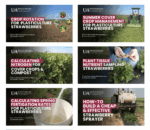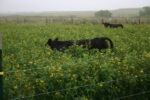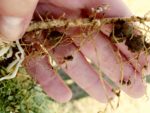The educational materials listed on this page are about Nutrient Management.
A nutrient management plan is used to manage the application of plant nutrients and soil amendments. Integrated nutrient management may include utilizing variable rate application, soil inoculants, microbial inoculants, biologicals, foliar feeding and proper fertigation techniques and fertigation systems. An understanding of nutrient cycling can also aid in budgeting and supplying nutrients for plant production, while minimizing soil and water pollution. Farmers can harness the power of the nitrogen cycle by using organic fertilizer and manure to supply plant nutrients. Careful nutrient management can also improve the overall condition of soil, especially if your plan includes cover crops. Key practices include biological inoculants, nutrient cycling, fertigation, organic fertilizers, reduced applications, foliar feeding, municipal wastes, cover crops.
Building Soils for Better Crops, a book offered by SARE, helps farmers navigate ecological soil management strategies. A useful bulletin, Smart Water Use on your Farm or Ranch, addresses the role of water in a farm system and in nutrient management. The Season Extension: Fertility Management Topic Room helps producers gain knowledge of effective and proper fertility management techniques, including fertigation, to improve nutrient cycling on a farm. What is Sustainable Agriculture? provides information on best practices the encourage the stewardship of land, water and air resources.
Showing 1-6 of 6 results

Optimizing Nutrient and Water Management for Organic Mixed Vegetable Production Systems
These videos feature farmers in Florida who share their practices and experiences when it comes to managing nutrients and water in organic systems. Impact of clay amendments on nutrient and water management This video showcases the impacts of clay amendments on nutrient and water management at Siembra Farm, located near Gainesville, Fla. Grazing cover crops […]

Sustainable Strawberry Production Video Series
The videos on this page were developed by the University of Arkansas as part of a training program to help Extension and Natural Resource Conservation Service (NRCS) agents share information with strawberry growers about sustainable practices. The videos plus additional information about the training program are also available at the University of Arkansas Sustainable Practices […]

Evaluating Nutrient, Soil Health, and Economic Benefits of Compost Additions to Summer Cover Crops for Strawberries in North Carolina
Over the past 8 years, a team of multidisciplinary faculty and students at NC State University have conducted various field-based studies at the Center for Environmental Farming Systems (CEFS) and on-farm research examining the impact of summer cover crops, compost additions and applications of beneficial arbuscular mycorrhizal fungi and vermicompost on soil health, nutrient availability, and yields in conventional and organic strawberry production systems.

Grazing Cover Crops in Cropland
For some producers with extensive experience using cover crops, grazing can be a ‘next step’ in obtaining additional economic value while achieving environmental stewardship.

Nitrogen Release from Cover Crops
Nutrient management is a timely agricultural topic that boils down to determining the right rate, source, timing, and placement of nutrients. Cover crops can greatly influence nitrogen management either by providing available nitrogen for cash crops or by immobilizing nitrogen and creating the need for greater nitrogen fertilizer for cash crops.

Sustainable Year-Round Forage Production and Grazing/Browsing Management in the Southern Region
An educational training video to increase the productivity, quality, and production of forages, as well as to improve management of existing pastures for sustainable livestock production.